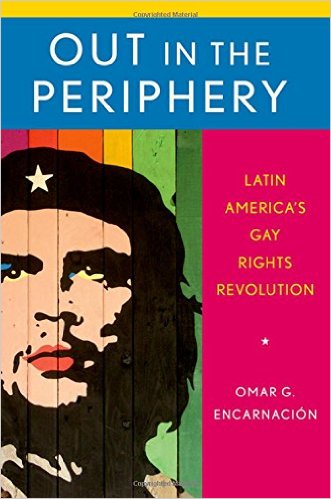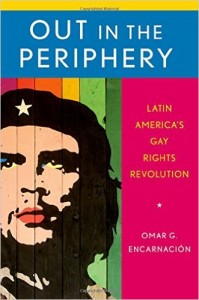 Out in the Periphery: Latin America’s
Out in the Periphery: Latin America’s
Gay Rights Revolution
by Omar G. Encarnación
Oxford University Press. 243 pages, $29.95
Latin America is inextricably linked to both Catholicism and machismo, yet progress in the struggle for gay rights has been steady and not hampered by the kinds of political push-back seen in the U.S. Omar G. Encarnación, a political science professor at Bard College, looks at Argentina and Brazil to show how progress has been made, and thwarted, along the way. Generalized homophobia has been less of a problem than extreme incidents, including murder, of LGBT people in South America. There’s much quibbling over the numbers, but no doubt they’re far too high even today; the word “homocaust” has been used with regard to homicide rates in Brazil. Argentina saw many gays expatriate to the U.S. and other countries when they felt unwelcome at home, then return when the cultural climate seemed more favorable, bringing global queer influences along with them. The message of tolerance was bolstered when people started to call out the Catholic Church for its hypocrisy in covering up the sexual abuse of minors by priests while condemning love and sex between consenting adults.
Argentina was first to legalize same-sex marriage and wasted no time aggressively courting the gay tourist market, siphoning visitors away from Rio de Janeiro. Brazil trailed Argentina in gay rights by roughly a decade but has since been gaining ground. However, interference from Evangelicals, both home-grown and North American exports, has complicated things. This academic study is a pointed reminder that while “gay rights” might be a borderless concept, it is also site-specific, needing to adapt to the cultural and political situation of different regions.
Heather Seggel
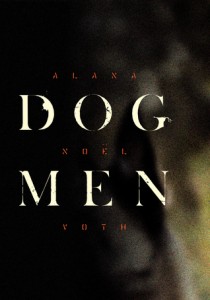 Dog Men
Dog Men
by Alana Noël Voth
Tiny Hardcore Press. 196 pages.
A collection of short stories on gay and lesbian themes, Dog Men bears out the Latin proverb homo homini lupus—“man is a wolf to man”—but in a context as searing as it is sexual. Dostoevsky gave us Notes from Underground; Voth gives us “Notes from the Sex Dungeon.” The title tale, like the six that follow, is full of limitless kink: two childhood friends, Amber and Tally (“maybe in love, but a love without sex”), are lured into a house whose horrors include animal carcasses and a cannibal in a dog collar. The tragic and unsettling story “Benediction” draws its inspiration from the martyrdom of Matthew Shepard, while “Marcelle” flirts with incest and features a masochist named Ronan and a dildo-wielding dominatrix. Voth saves the best for last: “Genuflection” is narrated by another gay male, Manny, who gains some street smarts from a “ghetto-bound messiah” named Black Tina. “Genuflection” eschews the sometimes hackneyed dialogue of the other stories for something more lyrical, even if it’s a hustler-with-a-heart-of-gold story set in the dingiest district of Denver. Dog Men is a work of queer erotica that at times transcends that niche. As Ronan puts it, “we were in the erotica section, or maybe it was romance. I could never tell.” At its best moments, Dog Men hovers somewhere between those two genres.
Colin Carman
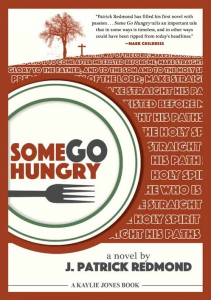 Some Go Hungry
Some Go Hungry
by J. Patrick Redmond
Akashic Books. 226 pages, $17.95
This is a first novel that takes its impetus from a verse in Corinthians that indicates, when it comes to a place at the Lord’s table, that not everyone will be equally served. The story of a small-town, Southern Indiana gay man who, after having lived in Miami, moves back to rural Indiana to help his parents run the family restaurant, may seem tame to some. But anyone who has come out in small-town America will understand how difficult it is to be who you are when the majority of customers at your family restaurant are the same ones you just saw in church. There’s a back story of a murder investigation of an unsolved case involving the narrator’s gay friend, who was killed twenty years earlier for being gay. Meanwhile, another classmate that the narrator had an affair with in high school is now back in town as a youth pastor and leading the crusade against anyone with a “deviant” lifestyle.
Some Go Hungry is at its best when confronting religious prejudice, and is even pulse-quickening when the narrator sits through one of his friend’s sermons aimed directly at him. The author could use a lighter touch with flashbacks, which often have a breathless quality. Still, only someone who has grown up in rural America could write so convincingly of the pressures there. It’s also refreshing to find a book that relates the experience of being gay somewhere otherhttps://glreview.org/wp-admin/profile.php than in a large city.
Dale W. Boyer
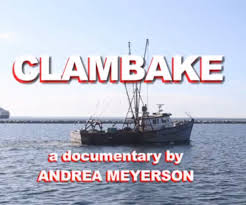 Clambake: 30 Years of Women’s Week in Provincetown
Clambake: 30 Years of Women’s Week in Provincetown
Directed by Andrea Meyerson
Stand Out Productions
Long before there were special weekends in Provincetown for single women, “leather mates,” or “Holly Folly” celebrants, there was Women’s Weekend. The Women Innkeepers of Provincetown, an organization founded in 1984 to provide mutual assistance to the dozen or so women who owned B&Bs and inns, were tossing around ideas to try to extend the tourist season. They decided to offer a weekend (later, a full week) around Columbus Day.
The story is told in a new documentary, Clambake, whose name derives from one of the earliest activities: a clambake at Herring Cove Beach. At first, the innkeepers worried that nobody would show up; later, they worried that there wouldn’t be enough food for the droves of women who arrived. In one of the most amusing anecdotes in the movie, an innkeeper was described as having “pulled out her ax” to chop lobsters in half, so that there would be enough food. Most of the innkeepers participated in illuminating interviews with filmmaker Andrea Meyerson, who makes good use of the limited historical material available to her.
Although many different activities have been offered over the years, Meyerson wisely chose to concentrate, for the most part, on the comedians. The wide variety of styles of standouts, such as Suzanne Westenhoefer, Kate Clinton, Karen Williams, and Mimi Gonzalez, make for constant laughs. This film does have its occasional longueurs (the touch football scenes do go on), but this is a wonderfully entertaining, mostly lighthearted documentary.
Martha E. Stone


